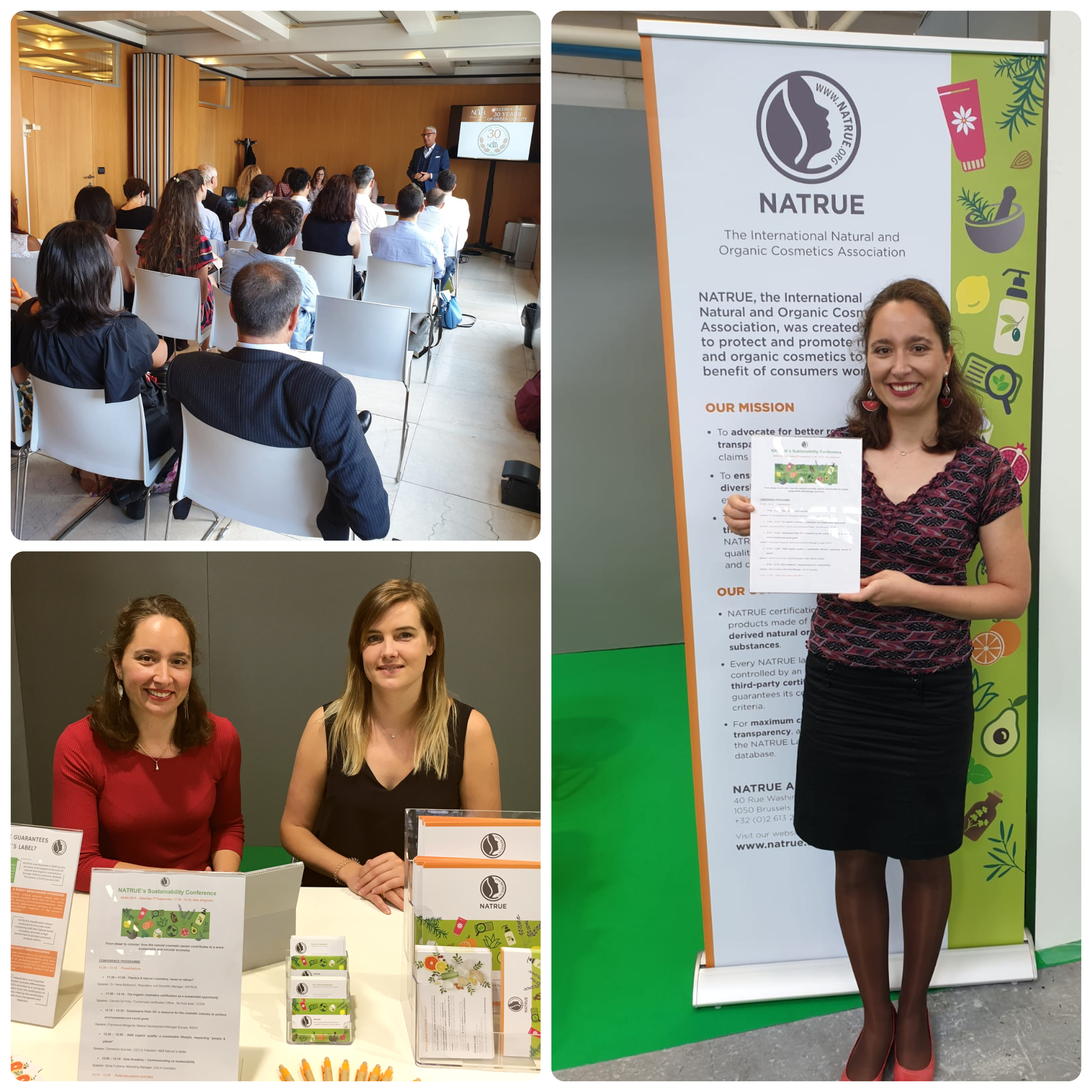
NATRUE’s Sustainability Conference, which took place last Saturday 7th September at SANA trade fair in Bologna (Italy), brought together representatives from NATRUE Members and NATRUE approved certifiers who presented an overview of the challenges and opportunities linked to sustainability in the natural and organic cosmetics sector. Some of the presented topics were the sustainable sourcing of raw materials (e.g. Palm Oil), sustainability standards and certifications, plastics and packaging in cosmetic products and legislative proposals and industry initiatives as part of the EU circular (bio)economy strategy and their impact on the NOCs sector.
The conference was opened by Dr. Hana Mušinović, Regulatory and Scientific Manager at NATRUE, who presented some of the major issues linked to sustainability in the cosmetics sector. As an introduction, Dr. Mušinović also explained some key concepts to understand the circular economy, with a particular focus on current relevant EU regulatory developments on plastics and packaging impacting all industries. During her presentation, Dr. Mušinović also explained NATRUE’s role in URBIOFIN, an innovation project funded by the Bio Based Industries Joint Undertaking (BBI JU) under the EU Horizon 2020 programme whose aim is to transform the organic fraction of municipal solid waste into new marketable bio-based materials such as, for instance, cosmetic packaging.
Carmen Di Pinto, a representative of CCPB, one of NATRUE’s approved certification bodies, explained how the certification based on the NATRUE standard guarantees consumers authentic naturalness in the cosmetic products certified with the NATRUE label. Mrs. Di Pinto also pointed out that NATRUE’s scheme can provide added values not only in regards to products’ formulation, but also when it comes to promoting sustainable practices (for instance, the usage of certified sustainably sourced Palm Oil will be part of NATRUE’s standard in 2020).
Francesca Morgante, Market Development Manager Europe at Roundtable on Sustainable Palm Oil (RSPO) presented RSPO’s certification scheme and described the problems linked to Palm Oil cultivation (such as deforestation) and how introducing traceability in the supply chain can ensure a more sustainable and environmentally friendly sourcing.
Domenico Scordari, CEO and President of N&B Natural is Better, presented his vision on how cosmetic companies should operate in a more sustainable way, respecting both people and the planet, as they have a responsibility to step up and show their engagement to the preservation of the environment as well as to the social development of local communities.
Silvia Fontana, Marketing Manager at GALA Cosmetici, presented Gala Academy, a digital platform dedicated to the world of natural and organic cosmetics whose objective is to inform consumers about diverse topics linked to natural and organic cosmetics, including sustainability, eco-friendly habits, etc.
A panel discussion with all the speakers followed after the presentations. All panellists acknowledged that a key challenge of sustainability in the cosmetic sector is the sourcing of ingredients. In order to produce their products, companies must source a wide range of ingredients from different sources, and this requires proper investment and commitment to identify reliable sources and to ensure that their due diligence procedures and audits are compliant with the highest quality standards.
Panellists also identified other aspects which companies need to take into account in order to ensure that their supply chains are not only sustainable, but also environmentally friendly, ethical and fair. Being part of one of the biggest industry sectors, cosmetic companies should see these challenges as an opportunity to make a real difference to set an example and work together to develop sustainable cosmetic products that match consumers’ expectations.
Transparency plays a key role in ensuring a sustainable sourcing. The impact of the growing conscious and ethical consumption trend translates into purchases that do not only consider the quality of a certain brand, but also its commitment with values that are close to the consumer’s heart. All panellists agreed that companies have a responsibility to clearly communicate what’s “inside” their products and to be ready to make their sourcing, production and distribution more sustainable and transparent.
As a reliable label for natural and organic cosmetic products, NATRUE is strongly committed to face these challenges head-on by adding new requirements to NATRUE’s standard in order to contribute to reducing our global environmental footprint through improved and respectful best practice.



 Deutsch
Deutsch
 English
English
 Español
Español
 Italiano
Italiano